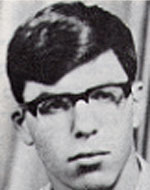Mordechai, son of Tzipora and Rafael, was born on the 5th of Sivan 5703 (June 8, 1953) in Tel Aviv. He completed his elementary studies at the Moshe Sharett School in Moshav Segula. Afterward he graduated from the De-Shalit School in Rehovot. Moti’s family, as his friends and family called him, immigrated to settle in Moshav Segula when he was three months old. In his home he absorbed the values of love of the homeland and love of land. He spent all his years in the village, in the open air and in the wild. Moti was a clever and clever student, and he learned not from the pursuit of high grades, but out of instinct and curiosity. In the class he listened quietly to everything he said, and excelled in remarkable listening ability, patience and the ability to absorb the words of his teachers. As he spoke, he could explain his position with calmness, without shouting and arguing. His desire to know and understand went far beyond the classroom, and he tried, and succeeded, to acquire a broad general education. He was interested in many fields and his knowledge acquired mostly from great reading. As a book lover he was not choosy, but he preferred science books and showed great knowledge. Many things troubled his mind and preoccupied her. These many interests have made Moti a highly versatile and interesting personality. Out of his love for literature, he developed a hidden desire for writing, which might have been realized, for he had written ability. Moti was an introverted boy who spent most of his time studying and learning. He did not much stand out in society, but at the same time did not refrain from taking part in its various activities. He created deep and Yaffa relationships with many people, and his friends saw him as a loyal and helpful friend, ready to stand by his friends in joy and in trouble. The values of patriotism and love of the land, which were a strong foundation in his soul, served as the basis for the growth of a quiet, innocent and honest personality. Nature, flora and fauna were an inseparable part of his being, and became the basis of the love of the homeland and the land. One of Moti’s most prominent traits was extreme honesty, the boundaries between which he and innocence sometimes blurred. True, he knew that his integrity harmed him in this respect, but remained true to his principles and his path. His honesty and extreme sense of justice guided him in many areas of his life. Moti was a beloved son of his family, and he loved his family very much. He was very devoted to his parents and brothers, as well as to the agriculture in which he grew up and from which he earned his living, and he helped as much as he could in the work of the agriculture and the daily work at home. Prior to his induction into the IDF, Moti volunteered to serve in a combat unit, although he was a gentle boy and devoid of violence, both in his daily life and in his views. After completing basic training, the soldier’s daily routines came to pass, with challenges and personal tests, crises and achievements. The very fact that he went to a combat unit was a difficult personal challenge, especially because of the sharp difference between the military lifestyle in a combat unit and his life in his home. At first he encountered difficulties in absorption, but soon became more and more accustomed to his friends in the unit, who appreciated him mainly because of his values and principles. He continued to be the same guy he had been before, with his deep love for reading and serious conversations about things that stood high in the world. He had not renounced any principle of those who had guided him in civilian life, and was still evident in his pursuit of justice and his great integrity. Moti was a regular soldier, and he was meticulous in carrying out every task he was assigned, out of a recognition of the duty of serving and filling a soldier’s job. During his army service, he helped his parents to a great extent, and together with his family did many things at home. As the date of his release approached, Motti debated how he would choose the future of civilian life. He feltBut still did not want to commit himself to it. During the Yom Kippur War, Moti’s unit fought the containment battles in the Golan Heights. In a battle that was abandoned at the Hermon outpost on October 7, 1973, Moti was hit by gunfire from a Syrian ambush during the retreat from the outpost that was occupied. He was laid to rest in the village cemetery of Warburg. Survived by his parents, sisters and brother. After his fall, he was promoted to corporal. His parents commemorated him by setting up a bookshop in his name in the public library in Moshav Segula. In addition, his parents published a pamphlet in his memory, including friends’ comments on his character; In a booklet published by the Gideon Battalion in memory of its fallen soldiers, a list is included in memory of Moti, in which members say of his military path.
